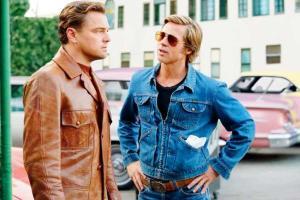With as much plot and pathos as cinema and swagger, Once Upon A Time In Hollywood, on August 15, is a serious win-win for Quentin

A still from Once Upon A Time in Hollywood
 Maybe the halo/legend simply starts with a multi-syllable, zingy name: Quen-Tin-Taran-Tino — sounds even heavier than Mar-Tin-Scor-Sese or Stan-Ley-Kub-Rick, or Fran-Cis-Ford-Copp-Olla, when preceded with, "A film by…."
Maybe the halo/legend simply starts with a multi-syllable, zingy name: Quen-Tin-Taran-Tino — sounds even heavier than Mar-Tin-Scor-Sese or Stan-Ley-Kub-Rick, or Fran-Cis-Ford-Copp-Olla, when preceded with, "A film by…."
ADVERTISEMENT
Perhaps it's the bratty, eternally collegiate, borderline bully's swagger in his public appearances. Which seamlessly reflect in his pictures. Transcending equally well when he talks about his movie influences, of all kinds, B-grade in particular, uniting film-buffs in ways that no director I know has.
Mainly because there is no air of artsy flatulence, when he expresses passion. He speaks movies for movies' sake, first. And he makes himself scarce, preserving an aura, as much around his works, as himself.
Or, is it his deeply fresh debut, Reservoir Dogs (1992), which he followed up with the non-linear Pulp Fiction (1994), overflowing with in-your-face coolness. Over a decade thereafter, despite only four features in the interim (Kill Bill 1, 2; Jackie Brown, being my favourite), Tarantino had been rendered critic-proof by critics themselves!
Know this from having been mildly walloped for feeling rather vacant in the head after the martial-arts blood-fest Kill Bill Vol 1 (2003). And this level of unreserved worship from the critical establishment is rather rare for a self-admittedly "genre filmmaker". Which isn't the same thing as the other director sitting on that same spot: Terrence Malik.
No doubt Tarantino remains among the most influential filmmakers of his generation. Been to Versova? You'll know. And yet, his bhakts continued to ape primarily his style and sometimes craft, rather than the substance — mostly immaculate writing, and spotless performances — that helped his films float beyond a simple genre.
There is, however, a switch in the gear, one noticed, with Inglorious Basterds (2008), and Django Unchained (2012), that came injected with a level of unvarnished truth that inevitably takes fiction to another level. Never mind the supremely self-indulgent The Hateful Eight (2015), an anomaly (in my eyes).
By now, you can tell Tarantino — so totally secure while creating a complex world he surveys, mixing it up seamlessly with story, emotions, and swagger — is only using film genre to fit his screenplay into a tight, recognisable box. And let the references, and set-pieces flow. Yup, just watched Once Upon A Time In Hollywood (Tarantino's ninth, and apparently, penultimate release).
For a filmmaker who's constantly referenced movies in his movies, Once Upon A Time... is his most open (love) letter to the movies itself — set in 1969 Los Angeles, zooming in to Hollywood bungalows and backrooms, Playboy Mansion and pretty young things, elaborate sets and sequences, rollickingly recapturing films, within his film.
And yet, this is as much about that cusp between the decline of Hollywood's golden age (late '50s, early '60s) and hippies taking over, as it's primarily about two friends — a "has-been" lead actor of TV Westerns, Rick Dalton (Leonardo DiCaprio), sharing the sunset of his professional life, with his former stunt-double, Cliff Booth (Brad Pitt). Didn't think this adjective would ever apply, but it is Tarantino at his most tender!
And what's the film's genre, you may ask? Well the film is definitely named after Sergio Leone's Once Upon A Time In The West (1968). Saying this not just because there's more than a smattering of Spaghetti Western in the movie, but also Tarantino has repeatedly mentioned Leone as his chief influence — someone whose operatic style of shot-taking he has doffed his hat to on screen in the past.
But, no. This is an out-and-out thriller. It is based on actor Sharon Tate's freaky murder by members of the homicidal 'Manson Family', which took place on August 9, 1969, in the home that Tate shared with filmmaker-husband Roman Polanski. The incident shook LA, and indeed America, for decades after.
Margot Robbie plays Tate. And her life plays out roughly as it would have. Because, sure, she existed. As did a whole lot of characters in the film, including the adorably arrogant Bruce Lee! Tate's neighbour, Rick Dalton, and his buddy Cliff Booth, obviously reside only in the writer Tarantino's imagination. Though, I'm told, they're roughly based on actor Burt Reynolds, and his long-time stunt-double, Hal Needham.
That said, make no mistake, characters in place, cracking it for sure, genre set, story-line ready, this is in every way a Tarantino film, essentially with clever lines/situations, recurrent fetishes (foot, Red Apple cigarettes, et al), love for movie-guns and madness, and indeed mortal combat that is in equal measure pornographic and comical.
The reason for the halo around Tarantino — omnipresent as a guardian's guiding voice in all his films — making him the father of '90s fan-boy culture, is actually the sort of serious deconstruction that follows his work's release. This is fun to watch/read (intend to at some point), only because at a textual level, the movie itself is so accessibly popish. Takes you a second viewing, maybe? Man, totally up for watching Once Upon A Time In Hollywood again.
Mayank Shekhar attempts to make sense of mass culture. He tweets @mayankw14
Send your feedback to mailbag@mid-day.com
The views expressed in this column are the individual's and don't represent those of the paper
Catch up on all the latest Mumbai news, crime news, current affairs, and also a complete guide on Mumbai from food to things to do and events across the city here. Also download the new mid-day Android and iOS apps to get latest updates
 Subscribe today by clicking the link and stay updated with the latest news!" Click here!
Subscribe today by clicking the link and stay updated with the latest news!" Click here!







